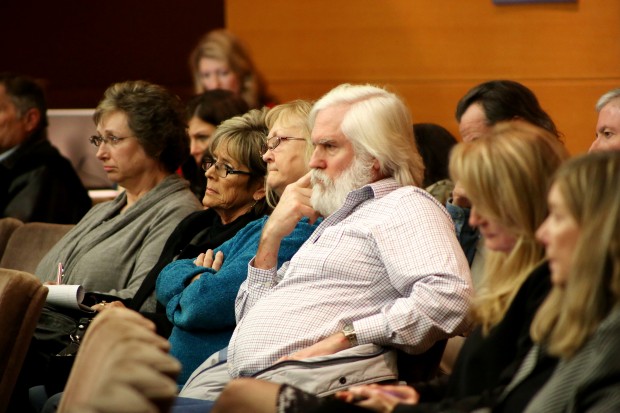Angry North Texans Demand State Shut Down Wells Linked to Earthquakes

Photo by Sam Ortega/KUT
Residents of the quake-stricken area called on state regulators to immediately suspend operations at the wells believed to be behind the tremors.
Dozens of residents and local officials from the towns of Azle, Reno and Springtown outside of Fort Worth bused down to Austin Tuesday to speak before state regulators about a swarm of recent earthquakes believed to be tied to the oil and gas industry. They had plenty of questions for the Railroad Commission, the state’s oil and gas regulator, but the commission had few answers.
While the quakes have been relatively small, not big enough to cause major damage, there’s been a lot of them: more than thirty over the last few months. They’ve caused cracks in homes, sinkholes and more than a few rude awakenings.
“The quakes started recently, and I didn’t think much about it until I was asleep at midnight,” testified Springtown resident Phil Doss. “It woke me up. I thought a 747 had landed on my roof. It was that bad.”
Springtown is one of several towns in Texas that saw a sudden onset of quakes over the last few years as a drilling boom expanded throughout the state. No earthquakes struck the Dallas-Fort Worth region before 2007, according to records from the United States Geological Survey. There have been more than a hundred since.
“You just don’t know when they are gonna happen again,” Reno resident Barbara Brown tells StateImpact Texas. “I rigged up a little thing to show me whenever we have tremors, and we have them three to five times any given day.”
The quakes are likely caused by wells used to dispose of wastewater from oil and gas drilling. Those disposal wells have been scientifically linked to quakes in other parts of North Texas. Within a mile or two of the current quake swarm are two active disposal wells, injecting some hundreds of thousands of gallons of wastewater a month into the earth below. Studies have shown that large volumes of wastewater can cause inactive faults to slip, triggering earthquakes.
Until recently, the Railroad Commission of Texas has maintained that the link between quakes and oil and gas wastewater disposal are purely hypothetical, despite several studies and instances of similar disposal well-related quake swarms in other states like Arkansas, Ohio and Oklahoma. But after the latest swarm in Azle and Reno, residents have formed a vocal opposition to to the disposal wells and quakes, catching the attention of both regulators and state lawmakers.
Tuesday, resident after resident, along with local officials, called on the commission to issue an immediate moratorium on oil and gas wastewater disposal in the area until there are more answers on what’s causing the quakes.
View Earthquakes Near Azle, Texas in a larger map
Map created by Andrew Weber for KUT News and StateImpact Texas. Orange circles represent earthquakes, wavy blue lines represent active wastewater disposal wells.
The commission, however, maintains that it doesn’t have the authority to do so and needs more time to study the issue. It is in the process of hiring a seismologist to do just that. But that was little comfort to Lynda Stokes, the mayor of Reno, a town of about 2,500 people that has been at the center of many of the quakes.
“While you’re doing your studies, I would like to ask you to shut these wells down,” Stokes testified before the commission. “And not make the citizens of Reno and Azle the guinea pigs for the study.”
People testified Tuesday that they were concerned about the safety of nearby dams and spillways, the integrity of oil and gas wells that could pollute water resources, and the impact the quakes are having on property values. Stokes says residents can’t afford the repairs needed in their homes. “There’s no insurance, there’s no way to fix the damages that these earthquakes have caused unless it’s out of pocket,” Stokes says.
The commission’s head lawyer maintained Tuesday that damaged buildings and cracked foundations do not fall under their jurisdiction. The state’s rules only deal with protecting mineral formations and freshwater, testified Lindil Fowler, general counsel for the commission.*
To shut down a disposal well, the company would have to violate its permits from the commission, permits which do not have any regulations for seismic activity. New rules could change that, but it would take time. Last week, state lawmakers announced they’re forming a committee to look into the quakes and see if changes to the rules are necessary.

Photo by Sam Ortega/KUT
Barry Smitherman, chair of the Railroad Commission, said that the commission does not have the authority to shut down the wells for causing earthquakes.
In the meantime, the commission’s efforts to research the correlation between fracking and the quakes are moving at a glacial speed, Mayor Stokes says.
“I can come down here, and I can plead [the residents] case to the commissioners, but all in all, it falls directly in their lap,” Stokes tells StateImpact Texas. “And as I saw here today, I don’t really expect to see too much out of it, yet.”
Barry Smitherman, chairman of the Railroad Commission, is running for Attorney General in the upcoming election.
“Do you think they’re going to put out a report before those elections come out?” Parker Democratic Chair Penny McCool says. “I highly doubt it.”

